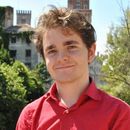Profile
Abstract
Jack McGrath is a research fellow and is studying for a doctorate under the supervision of the Chair of Theoretical Philosophy. Previously, he studied at the University of St Andrews and the University of Stirling for his MPhil in philosophy. For his MPhil dissertation, he connected insights contained in the work of Frege, Thomas Nagel, Elizabeth Anscombe, Gareth Evans, Fichte, and Sebastian Rödl to formulate a semantic account of “I” according to which the thought expressible by the use of “I” is the thought of a manifold of subjects spread out in space and time, thinking which one comprehends one’s being-in-the-world, which determines itself on account of the originally dyadic character of the thought expressible by the use of “I”—thought which, in truth, must not be one manner of thinking amongst others, but the condition of all thinking, Reason itself. Presently, he is working to further unfold, and grasp the implications of, the essentially dyadic character of thought.
Professional career
- since 06/2022
Research fellow and doctoral student under the supervision of the Chair of Theoretical Philosophy at the University of Leipzig - 01/2023 - 05/2023
Lecturer for “Philosophy and Film” and Teaching Assistant for “Philosophy, Ethics, and Life” - University of Stirling - 09/2022 - 12/2022
Teaching Assistant for “Philosophy: What’s it all About?” and “From Plato to Existentialism” - University of Stirling - 05/2022 - 08/2022
Lecturer for the University of Stirling’s International Summer School (Philosophy/“Current Issues in Moral Philosophy”) - 02/2022 - 05/2022
Teaching Assistant for “Mind, Value, and Reality” - University of Stirling
Education
- 09/2020 - 09/2022
MPhil Philosophy - University of St Andrews and University of Stirling - 10/2017 - 06/2020
BA (Hons) Philosophy - University of York
My research seeks to explicate the character of the thought said to be associated with the use of “I”, the thought thinking which we comprehend our being-in-the-world.
I take as my guide, most especially, two insights contained in Anscombe’s “The First Person”.
The first is the insight that ‘“I”-thought’, being an act of mind, can be elucidated only through articulation which is of the form of what we can term “self-conscious revelation”, articulation which is itself nothing other than a certain actualisation of that which it seeks to understand and a casting of light on that which is always already comprehended. Here, as articulation of this sort is possible only on account of what language is, I hold fast to the fundamental insight of the analytic tradition: the insight that language is the key to explicating acts of mind.
The second is the insight that ‘“I”-thought’ must be thought of a manifold of subjects spread out in space and time which must not be originally determined through the aid of receptivity. Here, I am led to formulate an understanding of a notion familiar to the post-Kantian German idealist tradition: the notion that ‘“I-thought’ must be essentially dyadic, not monadic, in character, a relation wherein two recognise one another as human beings.
In all this, I am also keen to explore whether the relation of recognition constitutive of ‘“I-thought’ may be centrally guiding in ethics and aesthetics.
-
WS 2023/24 B.A. Seminar: Introduction to English Texts in Philosophy
-
SS 2023 B.A. Lecture and Seminar Course (University of Stirling): Philosophy and Film
Centred on Stanley Cavell’s “The World Viewed”, this module posed three questions: What is film? How does modernism bear upon film? What should film do, now? As the module progressed, the topic of self-consciousness, established through connecting themes across Wittgenstein, Anscombe, and Fichte, became of paramount importance. And in support of that topic the module also touched on myth, psychoanalysis, and Andrei Tarkovsky’s remarks on “The Image”.
